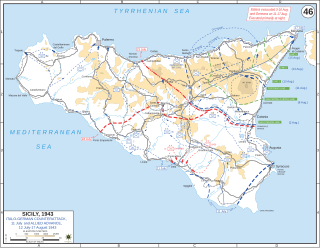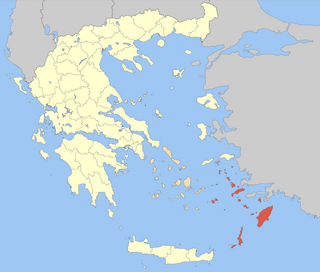
Operation Bodyguard was the code name for a World War II deception strategy employed by the Allied states before the 1944 invasion of northwest Europe. Bodyguard set out an overall stratagem for misleading the Oberkommando der Wehrmacht as to the time and place of the invasion. Planning for Bodyguard was started in 1943 by the London Controlling Section, a department of the war cabinet. They produced a draft strategy, referred to as Plan Jael, which was presented to leaders at the Tehran Conference in late November and, despite scepticism due to the failure of earlier deception strategy, approved on 6 December 1943.

The Allied invasion of Sicily, also known as the Battle of Sicily and Operation Husky, was a major campaign of World War II in which the Allied forces invaded the island of Sicily in July 1943 and took it from the Axis powers. It began with a large amphibious and airborne operation, followed by a six-week land campaign, and initiated the Italian campaign.

The Twelfth Army was a British Army formation during the Second World War. The Twelfth Army denotation was actually used twice; firstly, in 1943, for a fictional formation and secondly, in 1944/45, in Burma.

Operation Slapstick was the code name for a British landing from the sea at the Italian port of Taranto during the Second World War. The operation, one of three landings during the Allied invasion of Italy in September 1943, was undertaken by airborne troops of the British 1st Airborne Division, commanded by Major-General George Hopkinson.

The North African campaign of World War II took place in North Africa from 10 June 1940 to 13 May 1943, fought between the Allies and the Axis Powers. It included campaigns in the Libyan and Egyptian deserts, in Morocco and Algeria, and in Tunisia. The Allied war effort was dominated by the British Commonwealth and exiles from German-occupied Europe. The United States officially entered the war in December 1941 and began direct military assistance in North Africa on 11 May 1942.

The Italian campaign of World War II, also called the Liberation of Italy following the German occupation in September 1943, consisted of Allied and Axis operations in and around Italy, from 1943 to 1945. The joint Allied Forces Headquarters (AFHQ) was operationally responsible for all Allied land forces in the Mediterranean theatre and it planned and led the invasion of Sicily in July 1943, followed in September by the invasion of the Italian mainland and the campaign in Italy until the surrender of the Axis forces in Italy in May 1945.
Operation Mincemeat was a successful British deception operation of the Second World War to disguise the 1943 Allied invasion of Sicily. Two members of British intelligence obtained the body of Glyndwr Michael, a tramp who died from eating rat poison, dressed him as an officer of the Royal Marines and placed personal items on him identifying him as the fictitious Captain William Martin. Correspondence between two British generals that suggested that the Allies planned to invade Greece and Sardinia, with Sicily as merely the target of a feint, was also placed on the body.

The Mediterranean and Middle East Theatre was a major theatre of operations during the Second World War. The vast size of the Mediterranean and Middle East theatre saw interconnected naval, land, and air campaigns fought for control of the Mediterranean, North Africa, the Horn of Africa, the Middle East and Southern Europe. The fighting started from 10 June 1940, when Italy declared war on United Kingdom and France, until 2 May 1945 when all Axis forces in Italy surrendered. However, fighting would continue in Greece – where British troops had been dispatched to aid the Greek government – during the early stages of the Greek Civil War.

The military history of Greece during World War II began on 28 October 1940, when the Italian Army invaded Greece from Albania, beginning the Greco-Italian War. The Greek Army temporarily halted the invasion and pushed the Italians back into Albania. The Greek successes forced Nazi Germany to intervene. The Germans invaded Greece and Yugoslavia on 6 April 1941, and overran both countries within a month, despite British aid to Greece in the form of an expeditionary corps. The conquest of Greece was completed in May with the capture of Crete from the air, although the Fallschirmjäger suffered such extensive casualties in this operation that the Oberkommando der Wehrmacht abandoned large-scale airborne operations for the remainder of the war. The German diversion of resources in the Balkans is also considered by some historians to have delayed the launch of the invasion of the Soviet Union by a critical month, which proved disastrous when the German Army failed to take Moscow.
HMS Seraph was an S-class submarine built for the Royal Navy during the Second World War. Completed in 1942, she carried out multiple intelligence and special operations activities during World War II, the most notable of which was Operation Mincemeat.

Operation Zeppelin was a major military deception operation run by the British during the Second World War. It formed part of Operation Bodyguard, the cover plan for the invasion of Normandy in 1944, and was intended to mislead German intelligence as to the Allied invasion plans in the Mediterranean theatre that year. The operation was planned by 'A' Force and implemented by means of visual deception and misinformation.
Operation Cascade was the codename for an Allied military deception operation during the Western Desert Campaign of World War II for North Africa. Operation Cascade was one of the first successful Allied deception operations in World War II, and provided valuable experience for later operations.

The Dodecanese campaign was the capture and occupation of the Dodecanese islands by German forces during World War II. Following the signing of the Armistice of Cassibile on 3 September 1943, Italy switched sides and joined the Allies. As a result, the Germans made plans to seize control of the Dodecanese, which were under Italian control. The Allies planned to use the islands as bases to strike against German targets in the Balkans, which the Germans aimed to forestall.
Operation Cockade was a series of deception operations designed to alleviate German pressure on Allied operations in Sicily and on the Soviets on the Eastern Front by feinting various attacks into Western Europe during World War II. The Allies hoped to use Cockade to force the Luftwaffe into a massive air battle with the Royal Air Force and U.S. Eighth Air Force to give the Allies air superiority over Western Europe. Cockade involved three deception operations: Operation Starkey, Operation Wadham, and Operation Tindall. Operation Starkey was set to occur in early September, Operation Tindall in mid-September, and Operation Wadham in late September 1943.
Operation Waterfall was part of Operation Barclay, which was a deception to try to trick the Germans into thinking the Allies would land elsewhere in the Mediterranean other than Sicily, where they were going to land. It involved creating a decoy army in the eastern Mediterranean to make it look like they were targeting the Balkans. The Anglo-American force also created some dummy inflatable tanks and vehicles.
Operation Animals was a World War II mission by the British Special Operations Executive (SOE), in cooperation with the Greek Resistance groups ELAS, Zeus, EDES, PAO and the United States Army Air Force. The operation took place between 21 June and 11 July 1943 and included an organized campaign of sabotage in Greece, to deceive the Axis Powers into believing that Greece was the target of an Allied amphibious landing, instead of Sicily. Despite the mission's success, the Greek civilian population suffered from mass reprisals and British intervention into the internal affairs of the Greek resistance exacerbated the tensions between its various components.

Alexis Freiherr von Rönne was a German Army colonel and senior intelligence analyst. He became one of Hitler's favoured officers in the Abwehr, despite secretly being of anti-Nazi persuasion.
The Battle of Sarantaporos on 21 June 1943 was a successful ambush by the guerrillas of the Greek People's Liberation Army (ELAS) against a column of the German 117th Jäger Division. The ambush, carried out as part of Operation Animals, was one of the most successful operations against the Germans during the Axis occupation of Greece.










